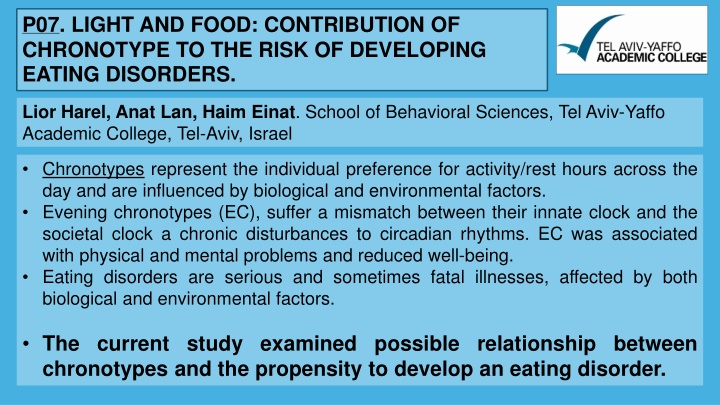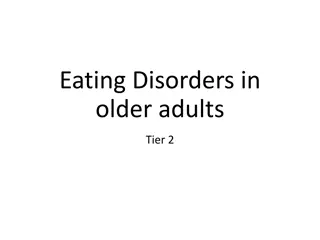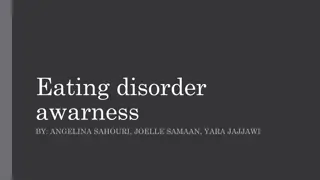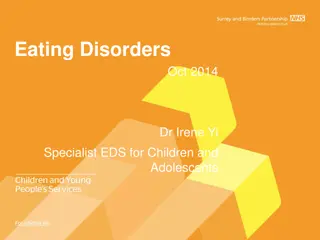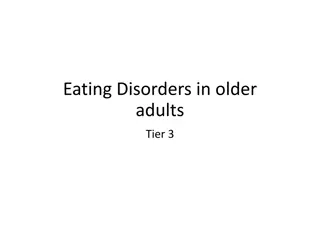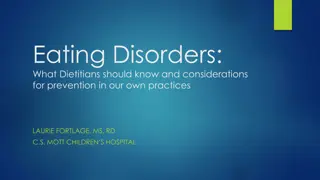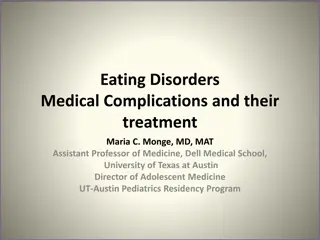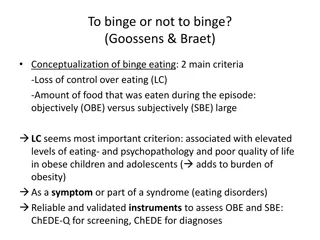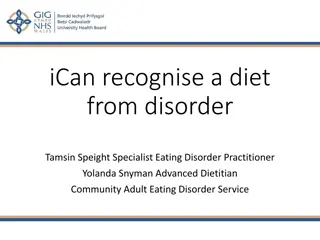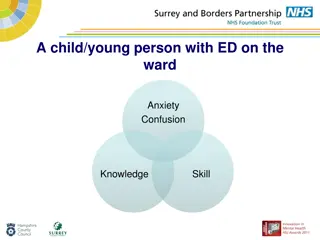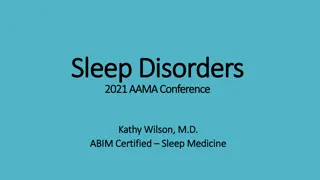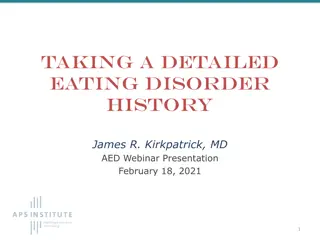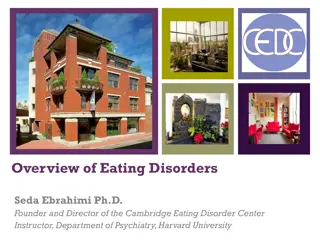Impact of Chronotype on Developing Eating Disorders
Chronotypes, representing individuals' morningness-eveningness preference, play a significant role in the propensity to develop eating disorders. Evening chronotypes, facing a mismatch between their internal clock and societal demands, have been linked to various health and mental health issues. A study involving 165 participants demonstrated strong correlations between chronotypes, body shape, and eating attitudes. Regression analysis highlighted the substantial contribution of morningness-eveningness preference, comparable to BMI, in predicting the inclination towards developing an eating disorder.
Download Presentation

Please find below an Image/Link to download the presentation.
The content on the website is provided AS IS for your information and personal use only. It may not be sold, licensed, or shared on other websites without obtaining consent from the author.If you encounter any issues during the download, it is possible that the publisher has removed the file from their server.
You are allowed to download the files provided on this website for personal or commercial use, subject to the condition that they are used lawfully. All files are the property of their respective owners.
The content on the website is provided AS IS for your information and personal use only. It may not be sold, licensed, or shared on other websites without obtaining consent from the author.
E N D
Presentation Transcript
P07. LIGHT AND FOOD: CONTRIBUTION OF CHRONOTYPE TO THE RISK OF DEVELOPING EATING DISORDERS. Lior Harel, Anat Lan, Haim Einat. School of Behavioral Sciences, Tel Aviv-Yaffo Academic College, Tel-Aviv, Israel Chronotypes represent the individual preference for activity/rest hours across the day and are influenced by biological and environmental factors. Evening chronotypes (EC), suffer a mismatch between their innate clock and the societal clock a chronic disturbances to circadian rhythms. EC was associated with physical and mental problems and reduced well-being. Eating disorders are serious and sometimes fatal illnesses, affected by both biological and environmental factors. The current study examined possible relationship between chronotypes and the propensity to develop an eating disorder.
Methods, procedures and tools Tools Participants Demographic questionnaire including height and weight for BMI computation) The morningness-eveningness questionnaire (MEQ) Body Shape Questionnaire (BSQ) Eating Attitudes Test-26 (EAT-26) Convenience sample of 165 participants (mean age = 35.45 11.89) recruited through social media. Participants signed informed consent before starting the study. Study was approved by the MTA Ethics committee. The study included a number of questionnaires through the Qualtrics platform. Statistical analysis Pearson s correlations were used to detect initial relationships between main variables. These were followed by step-wise regression analysis. presented
Results 1: Correlations with the propensity to develop eating disorders (EAT-26) There was no sex effect on EAT-26 [t(163)=0.52, p=0.6]. There was a weak but significant correlation between BMI and EAT-26 [r=-0.16, p=0.04]. MEQ and BSQ were strongly correlated with EAT-26 [for MEQ r=-0.53, p<0.001; for BSQ r=0.86, p<0.001]. 8 0 8 0 8 0 6 0 6 0 6 0 E A T - 2 6 E A T - 2 6 E A T - 2 6 4 0 4 0 4 0 2 0 2 0 2 0 0 0 0 1 5 2 0 2 5 3 0 3 5 4 0 0 5 0 1 0 0 1 5 0 2 0 0 2 5 0 2 0 4 0 6 0 8 0 B M I B S Q M E Q
Morningness-eveningness preference contributes to the propensity to develop an eating disorder regression analysis. Regression analysis demonstrates that morningness-eveningness preference has a significant contribution to the inclination to develop an eating disorder. The contribution is at approximately the same strength as the contribution of BMI. The entire model is highly significant and predictive [r2=0.78, F(3,161)=188.5, p<0.0001]. BMI MEQ BSQ r2=-0.13, p=0.002 r2=0.8, p<0.0001 r2=-0.15, p<0.001 Propensity to develop an eating disorder
Summary Chronotypes, representing morningness-eveningness preference of individuals were repeatedly demonstrated to have significant impact on life. Evening chronotypes were associated with multitude of problems related to health, mental health and well-being. In the current study we demonstrate that eveningness is also associated with higher propensity to develop an eating disorder. Chronotherapy interventions might be a possible adjunctive intervention in the prevention and treatment of eating disorders.
